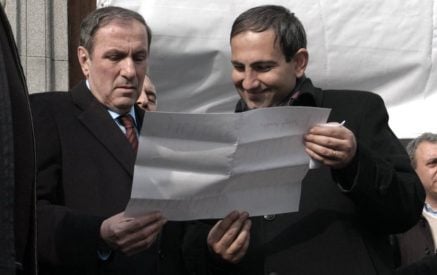There is no independent public body in Armenia, nor individual figures and intellectuals, whose opinion would be prestigious for all layers and political forces. Usually, accusations are sounded here and there that these people are bad, corrupt and discredited, we do not have intellectuals and so on. The main reason, in my opinion, is that over the 25 years of the independent Armenia we do not spare each other: once we saw that someone obtains even a small, even relative prestige, we do everything to “catch dirt” on this person. And since there is no mortal in our planet, about whom one cannot say anything negative, these real and fabricated stories based on jealousy, envy, and unscrupulous competition becomes a standard for assessment, and the people’s word and thought are depreciated.
It seems that we do not have a more remarkable artists in the modern history than Tigran Mansuryan and Hrant Matevosyan. But when in 1996 they were advocating in favor of Levon Ter-Petrosyan, they were teasing these people, finding fault with and were labeling them as “corrupt.” In other words, they did not have an absolute authority, the citizens were not saying that if the artists of such caliber say something, then they know something. Since 1998, during the period of “anti-Vano” hysteria, talented poetess Silva Kaputikyan began making serious accusations against Hrant Matevosyan, but her words were not unreservedly prestigious too, and we did not spare her too. This is normal: she did not spare her colleague, and she was eventually not spared.
Perhaps, the clergy should be in the first line of public and non-political figures. We have wonderful servants of God, certainly, not at the highest levels. But in this sphere too, no matter we outwardly maintain the rites, we have a certain cynicism in us: we ridicule the prayer, forgiveness and mutual love. In other words, here too, we do not have absolute authority, we do not spare each other, also our own human essence.
But, perhaps there is one more problem, which in psychology is called “integrity of character”. If I am gossiping with Petros about Poghos, Petros has all the reasons to think that I will do the same when talking with Poghos. In other words, I am no longer perceived as one integrity, who will defend its principles in all circumstances, regardless of who likes what. Fighting, shouting, stamping feet, it seems to me, is wrong in this case, it would mean that you are “in the fight” by someone. Telling your opinion in a low voice, decently and without offending anyone and not changing it depending on the environment, this is the most difficult part. Our public figures, it seems to me, are too much concerned about who will say what and who will think what. Running behind the estimates of the “outer world” is typical to the political figures, but the matter is about those who should have a universal rather than a “gang” authority.
Read also
Hence, it turns out that in more or less critical situation, the word of the people who are not one any side is absolutely not prestigious, and in this conditions, the first plan come the crowd-guiders, people whose every second word is the “people”. If, for example, one says that respecting and welcoming any social and political fight, the parties should refrain from the steps instigating collision, it would be viewed as dictated by someone or, at least, a non-sincere step. And today, it is still not the “most crises” situation. As they say, let this be our hardest day.
… Swiss psychologist of the 20th century, Carl Gustav Jung, who, as it is known, was studying the symbolic manifestation of the dreams, was on a business trip to Australia to study the life of local tribes. “Do you see dreams?” asks the scientist to the aborigines. “Yes,” they reply, but our dreams symbolize nothing, the dreams of our chieftain and shaman are decisive for us.” Jung goes to the mentioned people, but it turns out that the latter too no longer consider their dreams “significant”. According to the chieftain and shaman, now (in 1930-ies) we should examine and interpret the dreams of the prosecutor, i.e. the British official’s dreams.
Who is the one who “sees our dreams”?
Aram ABRAHAMYAN, «Aravot” daily























































